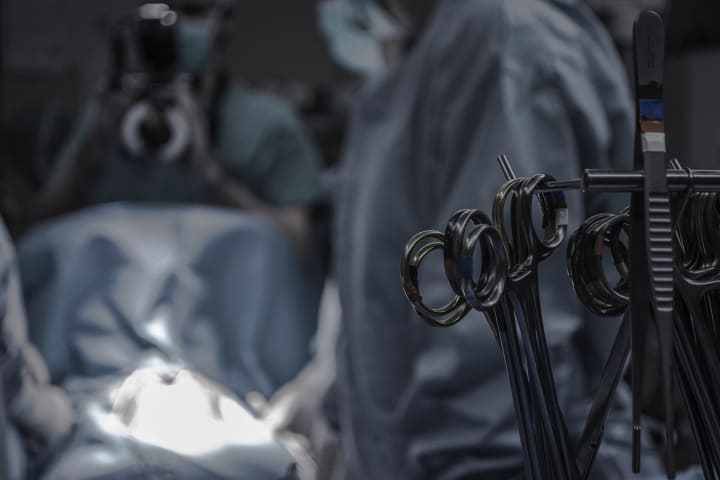True Terror: Anaesthesia Awareness
Discover the excruciating condition of anaesthesia awareness...

Anaesthesia awareness is the experience of becoming aware during a surgery, when under general anaesthetics.
I recently wrote about the phenomenon of Sleep Paralysis, which is a state in which you suddenly wake from sleep but cannot move or speak. In the most disturbing cases, you can experience terrifying auditory and visual hallucinations, read more about it here.
Although sleep paralysis is certainly a troubling experience, anaesthesia awareness may just be worse, depending on your tolerance for physical pain. Imagine sleep paralysis, minus the hallucinations, but you can feel yourself being cut open and are powerless to stop it.
The American Association of Nurse Anaesthetics define the experience as:
Under general anaesthesia, a patient is given medications intended to cause unconsciousness and relieve pain. If the medication to render the patient unconscious fails, awareness occurs. In other words, the patient wakes up, becomes aware of certain events occurring during the surgery, and may recall some or all of the events. Further, if the medication to relieve pain fails or is inadequate, the patient may feel pain while awake. Finally, cases involving general anaesthesia often require the patient to be given medication intended to prevent movement. In very rare instances, the sleep and pain medications fail while the paralytic agent does not, making it virtually impossible for the patient to communicate this dire situation to the anaesthesia providers.

Studies have previously suggested that cases of becoming aware under general anaesthetic were between 1-2 in every 1000. A study in 2013 found that the results may be a lot lower. The findings indicate the number to be 1 in every 15,000. They also found that two thirds of patients who became aware did not feel any pain in this state. This conflicts with other evidence that may suggest as many as 1 in 20 people are aware during procedures.
Anaesthesia awareness usually occurs due to inadequate anaesthetics or equipment but it could be prevented in some cases with the aid of brain monitoring technology, according to the AANA.
Anaesthesia awareness can be an excruciating and extremely traumatic event, causing some people to be left with post-traumatic stress disorder. Mosaic Science describes Donna's experience:
It should have been a routine procedure, but, for reasons that are far from clear, the general anaesthetic failed. Rather than lying in peaceful oblivion, she woke up just before the surgeon made the first cut into her abdomen. With her body still paralysed by the anaesthetic drugs, she was unable to signal that anything was wrong.
So she remained frozen and helpless on the operating table as the surgeon probed her body, while she experienced indescribable agony. “I thought, ‘This is it, this is how I’m going to die, right here on the table, and my family will never know what my last few hours were like because no one’s even noticing what’s going on.’”
The lingering trauma can resurface with the slightest trigger, and still causes her to have “two or three nightmares each night”. Having been put on medical leave from her job, she has lost her independence. She suspects that she will never fully escape the effects of that day more than a decade ago. “It’s a life sentence.”

ODDEE shared a woman's experience of becoming aware during gallbladder surgery:
“At that point, I was aware, I could not scream because of the breathing tube, all I could think of is I have got to move some way; I was fighting for all I had in my mind to move as they proceeded with the second incision up by the rib cage, there is no words to describe the pain.”
People have described the experience to feel like an excruciating, burning pain and also explain a feeling of being buried alive in your own body. This is the sensation that Jeanette Magdelene shares, according to The Richest: She describes the pain as though “someone took a blowtorch and stuck it on the right side of my stomach.” She explained further “I couldn’t move anything. I was buried alive inside myself. Frozen from head to toe.”
Sometimes the trauma following the incident can be too much to handle, as was potentially the case with Sherman Sizemore. After undergoing a surgery to diagnose abdominal pain where he became aware under the knife, it is reported that he felt like people were trying to bury him for a couple of weeks leading up to the end of his life. Sherman Sizemore committed suicide and his family believe the reason he did so was because of the awful experience he had with anaesthesia awareness.
Carol Weihrer, who founded the Anaesthesia Awareness Campaign after her own experience with it, explains that suicidal thoughts are not uncommon. When discussing Sherman's case she said "It's the first time I know of anyone succeeding in taking their own lives because of this, but suicidal thoughts are not all that uncommon."

Anaesthesia awareness sounds like a horrifying experience and is undeniable nightmare fuel. There are things out there in reality that are arguably much more frightening than the fictional monsters of horror stories. Fact is often stranger, and scarier, than fiction.
Have you ever experienced sleep paralysis or anaesthesia awareness? I would love to hear your stories @curiouslycreepy on Twitter and @creepyandcurious on Instagram.
Stay creepy and curious, ghouls.
About the Creator
A. N. Merchant
Sharing factual and fictional stories of the horrific, disgusting, macabre and frightfully peculiar. Appealing to the morbid curiosity within us all.
@creepyandcurious - Instagram
@curiouslycreepy - Twitter






Comments
There are no comments for this story
Be the first to respond and start the conversation.